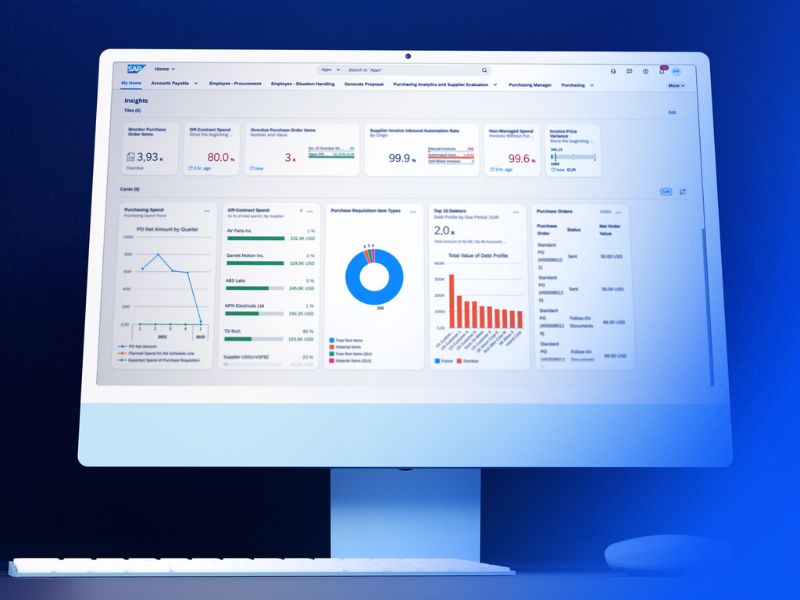How to benefit your company’s business processes with Integrated Management Systems
Understanding Integrated Management Systems
Regardless of the size of a company or the number of sectors it covers, it’s undeniable that technology enables better management and organization, delivering high performance in much shorter timeframes. This is where Integrated Management Systems come into play.
Today, there is a wide range of digital tools available, and for any manager or leader, selecting the right tool requires thorough research, weighing the pros and cons of each option. The goal is not only to enhance results and quality management but also to align the solution with the company’s mindset and organizational culture.
Integrated Management Systems (IMS) fit perfectly into this scenario. These systems streamline processes and, most importantly, organize projects in both the planning and execution stages, facilitate the storage and distribution of internal and external information, and support decision-making, positively impacting all stakeholders involved with the company.
IMS can also help companies meet their targets and even obtain ISO certifications like ISO9001 (quality management), ISO45001 (occupational health and safety), and ISO14001 (environmental management), ensuring compliance with relevant standards.
In addition, IMS ensures that social responsibility remains a priority within the company. Meta IT, offering integrated solutions like SAP S/4HANA and SAP Fiori, understands the importance of these values for its partners and clients.
Now that we know what an Integrated Management System is and why it matters, let’s dive into its objectives, characteristics, and the impact of its implementation in businesses of all sizes and industries.

What is the goal of an Integrated Management System?
The main goal of an IMS is to centralize and streamline access to information and to organize the various components of a corporate environment. But that’s not the only goal; there are many other benefits that make it a key tool for achieving true digital transformation. Here are a few examples of what IMS can do for a company:
- Put people at the center of digital transformation, acting as a support system for employees to optimize their activities further.
- Ensure transparency in internal processes and operations across all sectors.
- Foster more direct and fluid interaction between departments and staff.
- Improve the quality of products and services, increasing employee engagement and motivation.
- Achieve greater efficiency in less time.
- Provide more precise financial control.
- Save resources and reduce costs, aligning with environmental concerns.
- Assist in hiring external services or staff.
- Reduce errors, preventing double work, which can delay deliveries and damage client trust.
This list highlights how IMS promotes digital transformation while keeping people at the core of every activity, a principle that is also part of Meta IT’s culture.

How to implement an Integrated Management System
Before diving into the steps for implementing an IMS, it’s important to emphasize that integration between departments allows employees and leaders to be aware of different company goals and plans, supported by technology for quality management.
The first step is selecting the right IMS software, taking into account factors such as the company’s industry, internal processes, cost reduction needs, delivery volume, and active participation of employees and leaders.
As with any product purchase, initial research is crucial. Once this is done, selecting the right tool becomes easier. A current market trend is the use of SaaS (Software as a Service), a cloud-based technology with several advantages:
- It accelerates the conversion of assets into capital (profit).
- It ensures an open and transparent system for all stakeholders.
- It is accessible, allowing users to operate it from anywhere easily.
- It can be applied across various industries, making it customizable and scalable.
This is where experts like Meta IT step in, guiding companies through their digital transformation, helping them implement technologies like SaaS to integrate systems, operations, and communication, and reach the necessary digital maturity.
The next step is strategic planning. With the cooperation and integration of all sectors, managers and leaders conduct a data assessment—analyzing both successes and failures—to determine the best way to implement IMS and select the most suitable tool.
The third phase involves aligning with the company’s organizational culture and regulations, ensuring harmony among teams and departments. The ultimate goal is digital transformation, without losing sight of the company’s core values and people-centered approach.
Finally, the fourth step includes reviewing local and international regulations, especially if the company aims to expand into new markets.
Challenges and considerations when implementing IMS
We cannot overlook the fact that implementing a digital solution like an integrated management system doesn’t happen overnight. It is a gradual and continuous process that requires support from the company providing the tool and guidance on its proper use at every stage. Achieving full integration across company departments and the desired level of digital maturity takes time and patience, often a few months.
As Ricardo Magano, Operations and Services Manager at Meta IT, explains: “Integrated management systems allow value to be delivered in phases—dividing systems and deliveries across each implemented module. By introducing SAP as an integrated management system, the organization views its business as a whole. Therefore, when enabling a sprint or value delivery, the legacy system becomes relevant, as impacts are considered across the entire work platform.”
This process can take some time, but it should not be seen as wasted. On the contrary, this period is crucial as it also helps train all employees to use the new integrated management system confidently and securely.
Take the example of Bruning, a family-owned vehicle manufacturing company and a Meta IT client, with over 2,800 employees. The company had been using a proprietary system, but it was no longer capable of keeping up with its progress and market developments. Even more critically, it became increasingly difficult to centralize information and achieve quality management, hindering medium- and short-term results and compromising its growth.
After completing all the stages of implementing their chosen integrated management system, SAP, and with ongoing support from Meta IT throughout the operation, Bruning, in just 8 months, overhauled all its management processes, closing deals four times faster with unprecedented agility. Leaders and employees could monitor activities, production, and deliveries in real-time. This is the digital maturity we refer to, and one that many managers undoubtedly wish to see in their companies.
But why choose SAP over other options? Let’s explore next.
SAP S/4HANA and SAP Fiori
SAP is an international company headquartered in Germany, dedicated to creating solutions for managing business information and records. Its system is based on data integration to provide business solutions, resulting in high-quality management.
To achieve this, it facilitates direct relationships between clients, vendors, and suppliers, streamlines the financial sector, and supports production, logistics, and commercial exchanges. Meta IT has become a Golden Partner of SAP, solidifying its name in global markets.
In 2010, SAP launched its software, SAP S/4HANA, allowing companies to achieve digital transformation and maturity in a short time. Its technological structure accelerates operations and processes across all sectors, helping companies that implement it to achieve all expected results while staying ahead of competitors.
The “cherry on top” of SAP S/4HANA is its ability to create space for continued growth, now in an integrated, efficient, and technologically advanced manner, suited to modern demands.
As Ricardo Magano explains, “SAP provides a complete integrated management system. Through its different modules, the implementation of solutions delivers value to testing and validation teams. When the entire SAP solution is implemented, it becomes a system that supports the majority of an organization’s operations and processes.”
SAP Fiori is a set of design elements for creating business applications. Developers can use SAP Fiori to create apps that are intuitive and accessible on any device, making the user experience easy and engaging. Additionally, it is compatible with SAP S/4HANA. In summary, SAP Fiori offers an innovative system for building apps that complement the other technologies provided by Meta IT.
Of course, even after thorough data assessment and all the steps for selecting an integrated management system, some companies may still have doubts about whether it will truly support the expected digital transformation. In such cases, Meta IT provides assurance and support to its clients seeking quality management.
➡️ Learn more about how SAP S/4HANA can enhance your company’s governance. Click here to download our e-book.
Integrated Management Systems and the Meta Experience
The managers at Bruning, who were highly satisfied with SAP, first experienced the Meta Experience and described it perfectly: it’s like a “test-drive” of the system, reassuring the client and guiding them through every step of the implementation process, ensuring employees are never left alone to figure out how everything works.
This allows companies to experience the benefits of a system like SAP S/4HANA over a set period, gaining greater control of internal processes and focusing on achieving integrated management.
Before finalizing the contract, companies can evaluate all the details, any potential difficulties in implementation, and directly discuss any questions with Meta IT.
This dialogue and the opportunity to test the integrated management system is another benefit offered to partners and clients, demonstrating Meta IT’s commitment to quality and, most importantly, a genuine concern for the growth and success of those looking to implement such a product.
However, as mentioned earlier, nothing happens overnight. It requires a certain amount of time and collaboration with key players in this process to introduce and apply technology that leads to the digital transformation and maturity required today.
To implement solutions and management systems that integrate the various areas and segments of your business, contact Meta IT’s team of specialists!
We develop integrated management systems to drive your company’s growth.
We are experts in integrated management systems and work towards your evolution.
Learn more about Integrated Management Systems.
We are experts in Digital Transformation.

